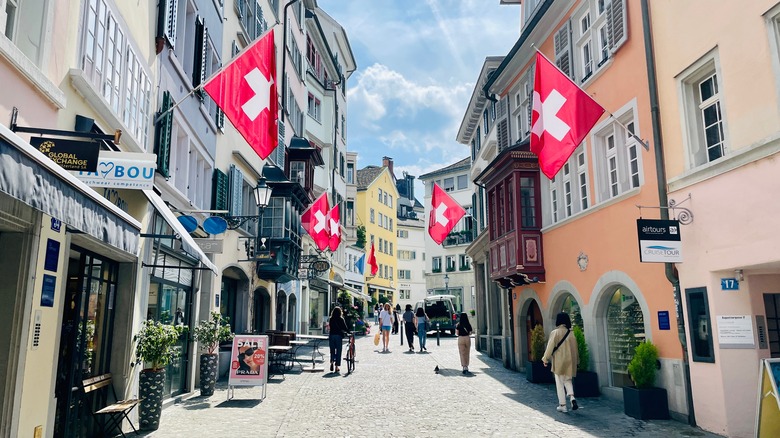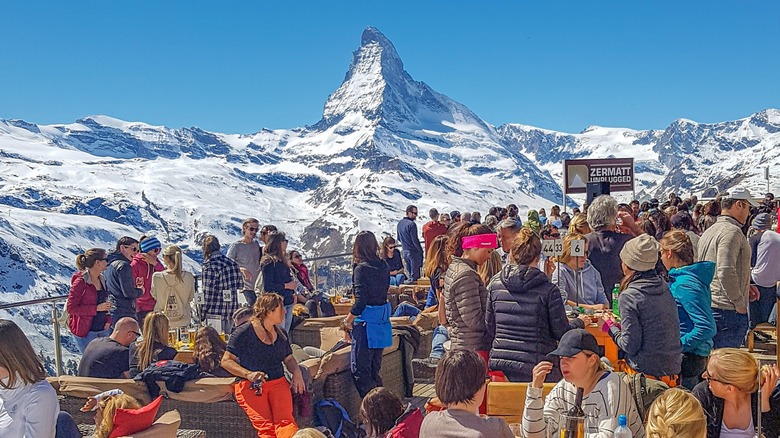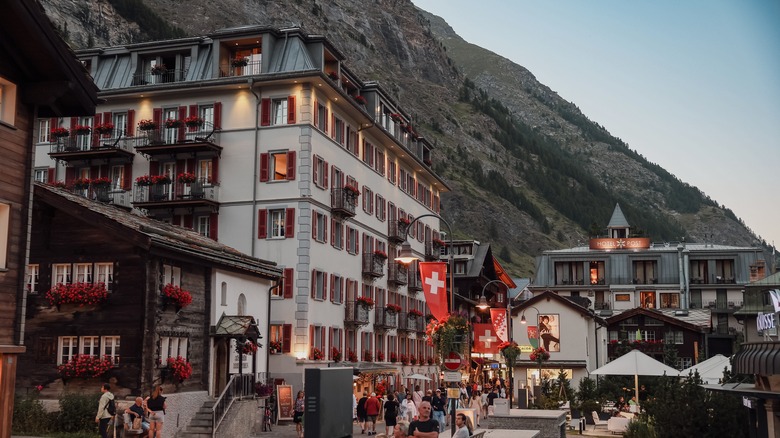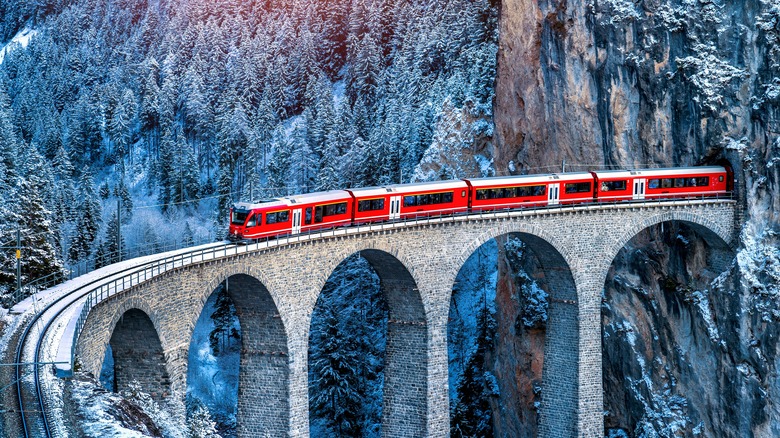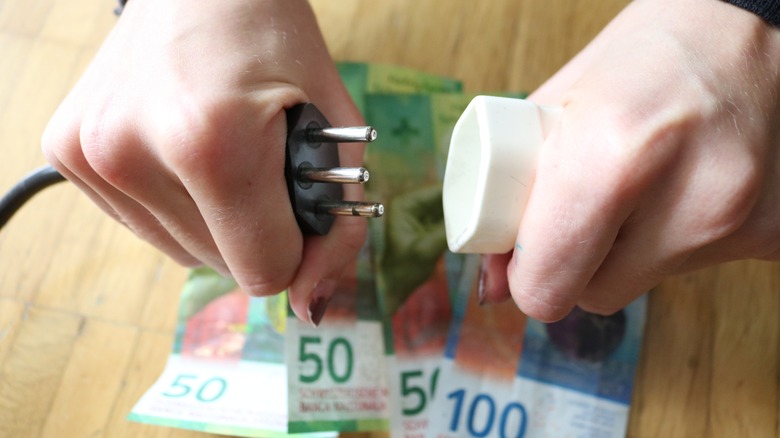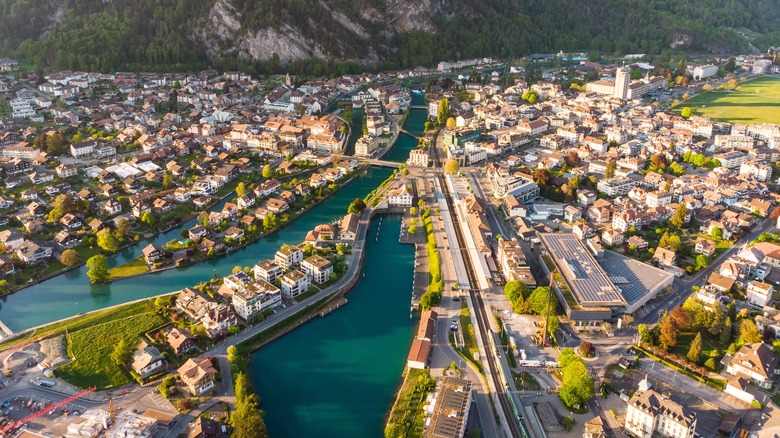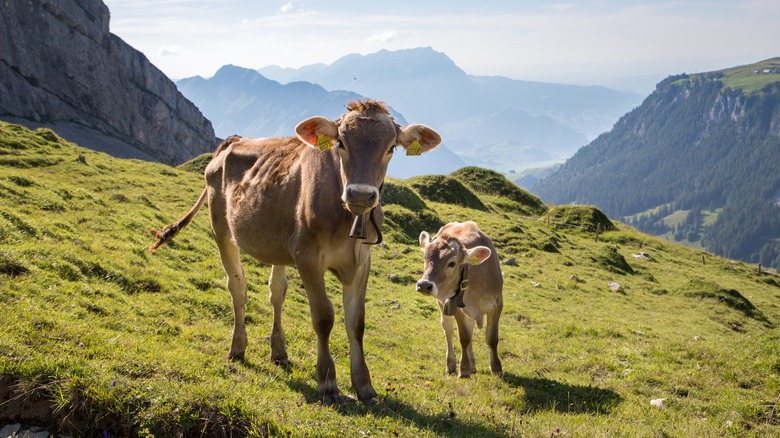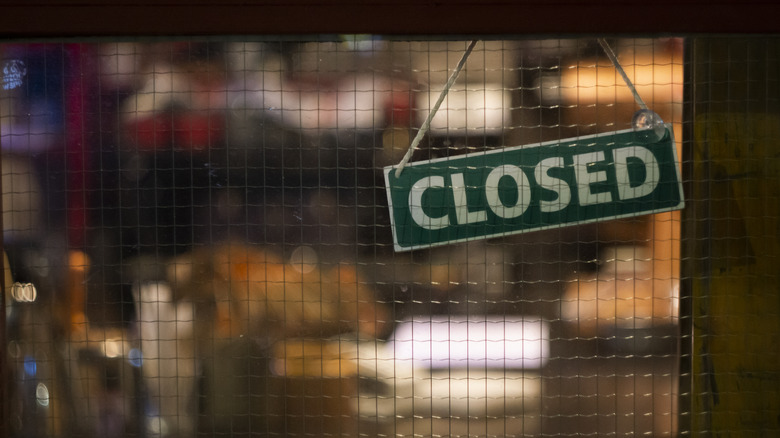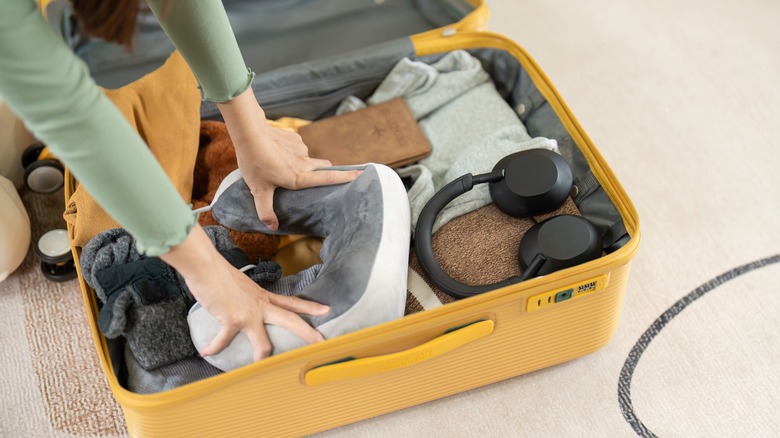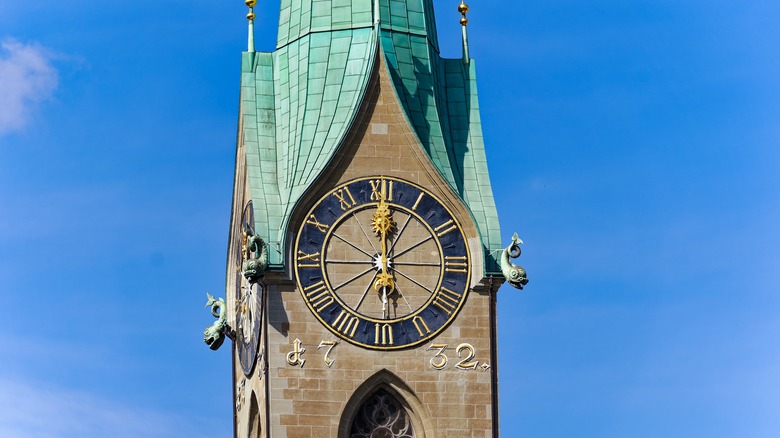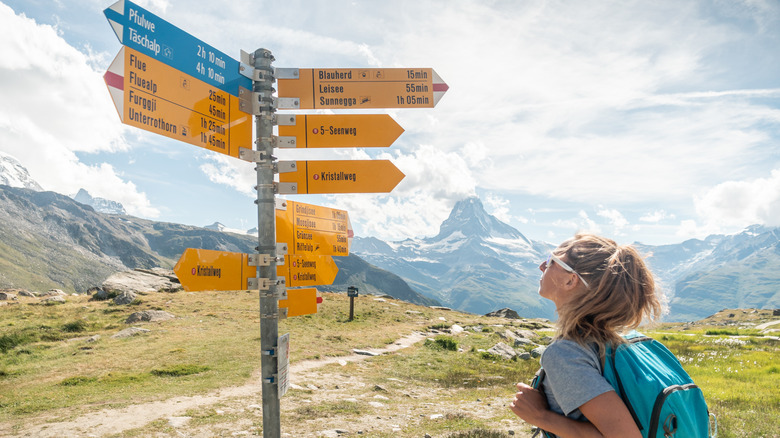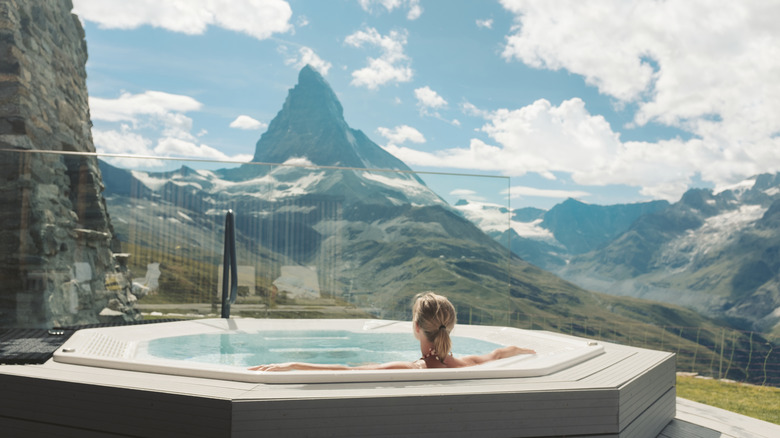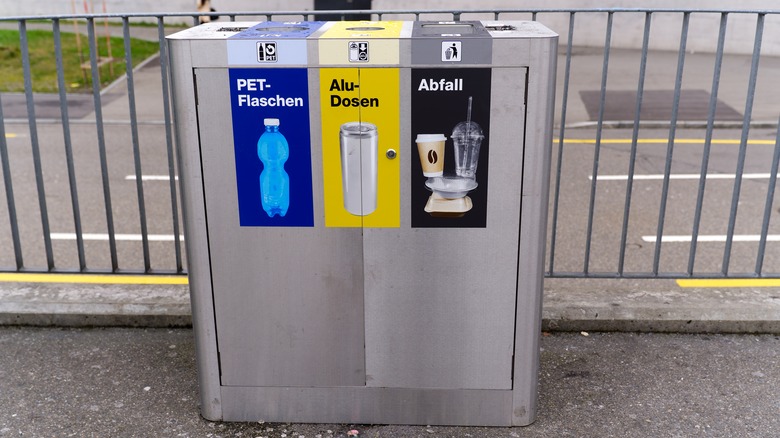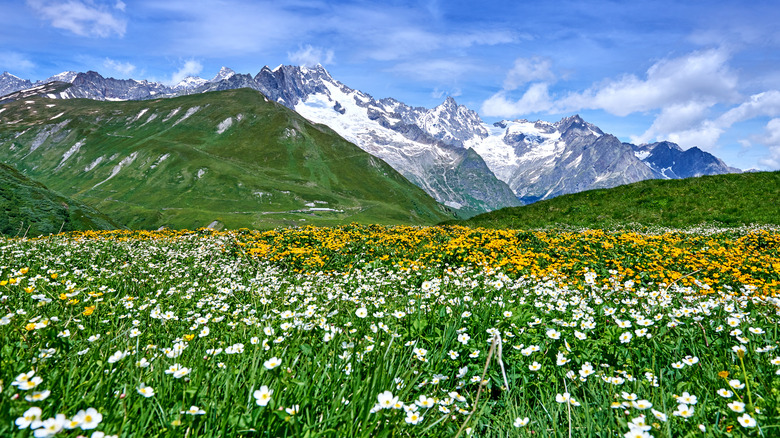The Most Common Mistakes To Avoid At All Costs On A Trip To Switzerland
We may receive a commission on purchases made from links.
Switzerland is an outdoor enthusiast's dream destination, a country in Europe that's like a nature fantasy come to life. This is where travelers will experience soaring alpine mountain ranges, deep lakes, flower-filled valleys, and quaint villages that haven't changed in centuries. You can also hike around a little-known wine region by a lake. But Switzerland is also modern and forward-thinking, with a transportation network that is envied around the world, and some avant-garde architecture that wows admirers from around the globe.
Sitting in the heart of Europe, the country might not be part of the European Union, but it's easy to reach from the United States, with a few direct flights from cities on the East Coast. Switzerland is a country that's wealthy, cosmopolitan, proudly multilingual, and tourist-friendly. But that doesn't mean that a trip there is straightforward. Switzerland has its own rules, quirks, and things to consider that can trip up any visitor. We've identified some of them to help ensure that your next journey to the country goes smoothly.
Assuming all Swiss are the same
Landlocked Switzerland isn't a huge country — at less than 16,000 square miles, it's about half the size of Maine. And yet, it's a place of huge cultural variety. There are four official national languages, with German being the most popular, followed by French, Italian, and Romansh. The Swiss often speak more than one language, and as anyone knows, language is a key determinant of a person's identity. What this means in Switzerland is that people from each part of the country have their own identity. As a user on Reddit, a Swiss French local who has worked in the Swiss German part of the country, notes, the variations are quite distinct.
The contributor explains that Swiss French are aligned with the Latin temperament — more open, emotional, and with a keen eye for food. Swiss Germans tend to be, according to the commenter, a little more reserved, serious, and formal. Swiss Italians will have traits that reflect their Italian heritage. Visitors should remember this, and not assume that the Swiss are a monolithic people.
Not making a reservation at a restaurant
For any restaurant that has a reputation as being a good place to eat, you should always book a table in advance. Switzerland gets busy in the high season, and at places like Lucerne, Zermatt, and Geneva — a city that is overrated and not worth a visit per Rick Steves — the throngs of tourists will be evident. On the blog MySwissAlps, one contributor suggests making a reservation in a destination like Zermatt even outside the summer and winter rushes, since it can be busy all year round.
And a poster on Reddit mentions that for most places worth having a meal at, a reservation is most certainly necessary. Once you're at the restaurant, one thing might strike you as a little surprising, possibly shocking. Free tap water is pretty universal at eateries around the United States, but in Switzerland, it isn't the norm. Diners are commonly served bottled water, or might even be charged for tap water, which is permitted in many parts of the country.
Not staying at a hotel
Swiss are known for their hospitality products, and the nation has some of the finest hotel management schools in the world. This is the country, after all, that produced César Ritz, a hotelier who founded the famous Parisian property that bears his name. A number of hotels are in old, historic buildings, and can be found anywhere, from next to glistening lakes, to others that sit by slick ski slopes. Given this combination, it would be a shame not to take advantage of the hotel offerings here. Great service is all but guaranteed, many of the properties come with an interesting backstory, and some hotels are truly spectacular.
The Park Hotel Vitznau looks like a fairy-tale castle set on a lake, while the Gstaad Palace brings the same kind of aesthetic to the terrain of the Alps. Rental units, like those offered on Airbnb, are available in Switzerland, but you won't have the same experience. Plus, as Airbnb noted in its review of the company's performance in 2023, it is looking to expand in Switzerland, as part of a plan to invest "in under-penetrated international markets," which suggests that there may be better rentals available in the future.
Not taking the trains
A well-worn joke about the Swiss railway system is that the trains are so punctual, that you can set your watch to them. While this might not be accurate 100% of the time, what it does convey is that the Swiss public transport system has a reputation for being reliable, timely, and efficient. The crown jewel of the transport system is the web of trains that extend throughout the country. Many run at high speeds, making traveling within Switzerland easy, and quick. In fact, most of the country can be reached within two hours, so sightseeing around Switzerland is effortless.
The efficiency comes with a cost, and travel is not super cheap. But you can be smart with your money, and buy a Swiss Travel Pass. These are available for a set number of days and allow unlimited travel on trains, boats, and buses around the country, and free admission to some museums. For the best deal, buy a 15-day pass, which costs 459 Swiss francs (about $530), and the whole country, where Europe's most scenic train rides, will be at your fingertips.
Not buying an adapter
It would be nice, in an ideal world, if we could take our phones, laptops, headphones, tablets, and their chargers, and use them with the same cables wherever we go. The introduction of the USB has certainly helped to make that reality closer, but unfortunately, plug sockets around the world differ, as does the voltage. In the United States, the voltage runs at 110-120 volts, but in Switzerland the current hums along at 230 volts. If you plug your local electronics into the Swiss grid, without using the proper adapter, then you'll be frying them.
In addition, the plugs are shaped with round pins (not the flat and round pins that we are used to in the U.S.). So not only will you need an adapter that can handle the change in current strength, but also one that will fit the different socket configuration. Adapters, therefore, are crucial for your trip there, and many options are available on Amazon, like the TESSAN Switzerland Power Adapter which can help charge your cell phone or tablet — just don't use it with your hair dryer as it's not a voltage converter. Try to get one that has multiple USB slots, and also think about purchasing an adapter that can work for different countries around the world.
Staying in the main tourist areas
With all that gorgeous scenery for visitors to enjoy, it should come as little surprise that Switzerland is a popular tourist destination. Who wouldn't want to see glassy lakes that stretch as far as the eye can see, or soaring jagged peaks topped in snow, or small alpine villages that look pretty enough to be put on a postcard? The country gets very busy, especially in the high season. In 2022, Switzerland recorded more than 55 million overnight stays in hotels, according to the Federal Statistical Office. The biggest draw is the Lake Geneva region, and places like Lucerne, Zurich, Geneva, and Zermatt consistently pull in travelers.
During peak seasons — the fine days of summer, and the ski season of winter — some parts of the country can have accommodations fully booked up. Consider, instead, visiting during the off-season or shoulder season. Or even think about parts of the country that are a little off the beaten track, or maybe less well known. These can include Bern, the Swiss capital, or Chur, which sits in a valley and has an old town that is off-limits to motor vehicles, and primed for leisurely wanders. Adventure sports fans will love the Swiss resort town of Interlaken that's both picturesque and filled with hiking trails and skiing tracks.
Rushing the trip
The trains in Switzerland can travel at great speeds, and with dizzying efficiency, but the pace of life in Switzerland is quite slow. For residents of the U.S. who live in big cities, life can whizz by at breakneck speed, and they might expect the same to be true in Switzerland. But part of the charm of the country is the relaxed way of living. Visitors would, therefore, do well to synchronize with it and soak in the ambiance of the country. Spending time with family and socializing are key values in Swiss culture, and people like to spend time just hanging out, enjoying life the way it's meant to be experienced.
While efficiency is certainly prized, haste is not, and rushing is not part of the national DNA. Don't expect to come to Switzerland with a long list of items you want to check off in a mad dash, because you won't get a real feel for the country without slowing down. And while getting around Switzerland can be quick and easy, it still takes time. Make an effort to really inhabit each place that you visit, rather than hurry through it like the Tasmanian devil.
Not preparing for seasonal hours
While Switzerland is definitely a year-round destination, there are periods when things are markedly quieter. And there are also moments between certain seasons when some hospitality businesses can close. This is because it makes no sense for them to operate. After all, there aren't enough tourists to make opening financially viable. The best weather, for many visitors, is from May through September, which coincides with the generally accepted tourism season. Within that span, July and August are the months where the conditions are sublime, where hiking trails on the mountains are finely rid of all their snow, and long days mean outdoor exploration can continue well into the evening hours.
From December through March, the ski resorts begin to ramp up their operations, and chalets, hotels, gondolas, and slopes start to thrum with visitors. If you travel to some of the more famous resort towns, such as Zermatt, outside of the summer and winter rushes, you might find many of the cafes, bars, restaurants, and hotels shuttered. Research the places where you will be going and ensure that everything is open for business as usual when you plan to be there.
Overpacking
With such broad geographic variety within Switzerland — from lake to river to mountain to meadows — the only thing that's missing in the landlocked country is the sea. Spend much time in the country, and you are likely to experience an array of terrain. You might think that this means you'll need to bring lots of different clothes to prepare for all sorts of conditions. But the reality is that it's far too easy to overpack for a trip to Switzerland, and it's something that you should avoid doing.
If you pack smartly, you can take less, which will be of great help if you intend to tour around the country on public transport. Getting everything into one carry-on for a week-long vacation isn't outside the realm of possibilities. You'll only really need to dress smartly if you are going to a nice restaurant. Otherwise, casual clothing is fine, with jeans, T-shirts, and shorts, all good options for daily wear. Keep something warm for cool nights, especially if you are in the mountains. Two things you must not forget are a daypack to carry when you are out exploring and a pair of comfortable shoes that you can walk in for miles and miles.
Not carrying cash
You might think, considering that Switzerland is one of the top 10 richest countries in the world by GDP per capita, according to the International Monetary Fund that it's up with all the latest payment technology. Perhaps apps and card payments are the only methods of doing transactions there, and nobody carries around bills and coins in their pockets anymore. That, however, is not the truth. While card payments are as commonplace as they are in the U.S., cash remains a more powerful medium for transactions than phone payments or other types of apps.
According to a report by the news agency Reuters in early 2024, a survey by the country's central bank looked at the way local businesses process payments. With a focus on businesses that had bricks-and-mortar operations (rather than those working exclusively online), more than 90% of them would take cash as a medium of payment for an item, but less than 60% would use a payment app. While you might make all your payments with a credit card, know that having cash will be more useful if your card ever gets declined.
Running late
The Swiss are known for their punctuality. This extends not only to their public transport but also to their own personal dealings. In a country where high-end, meticulously crafted watches are made — Switzerland is the birthplace of Rolex, Patek Philippe, Breitling, Omega, and many more horological icons — this might just seem like a natural extension of that reverence toward time. Whatever the reason, the fact is that Swiss people are on time, and they expect you to be also. Don't offend them by being late.
This can apply to a number of scenarios. If you have a restaurant reservation for 7 p.m. that means 7 p.m.—not 7:15 p.m., where you can stroll in and expect the staff to have your table waiting. If you make plans to meet someone or have booked an appointment somewhere, the time you are arranged is the time you should be there. Not being there when you say you will be is a basic lack of respect in the country.
Sticking to English
When you walk around Switzerland and encounter the locals, you might quickly marvel at their mastery of multiple languages. They might flit effortlessly from French to German to English all in the space of a few breaths. That kind of mental gymnastics might come as a surprise to many Americans, but for the Swiss, it's part of daily life. However, even if the Swiss speak more than one language with fluency or extreme proficiency, don't always assume that they're conversant in English.
There are people in Switzerland who won't speak much English, and if you want to communicate with them, you'll have to find another linguistic medium. Away from large tourist centers, and with older citizens, English might not be as universally understood or spoken. Depending on which part of Switzerland you'll be visiting, you should learn some basic German, French, and Italian, which would be useful in Switzerland's sunniest region known as "Little Italy." Simple greetings like "good morning," "good night," "please," and "thank you" are always useful. If you plan to use public transport, learn the terms for "arrival," "departure," and "platform" (in the case of trains). Many signs, however, will have English on them.
Expecting it to be a cheap vacation
While rankings might differ based on inputs used, Switzerland consistently lands among the top spots of the countries in the world that are the most expensive places to live. The bottom line is that this is an expensive country, so if you're looking for a budget vacation there, you might be in for a shock. A gallon of milk, for example, can easily cost about $7.
Housing is also expensive, not just for people living there, but also for tourists looking for a place to stay. The reason for this increased baseline cost is that people are paid competitively in Switzerland, from fast-food workers to company executives, and this pushes the prices of everything up. In addition, substantial import duties are levied on certain goods — meat is one example — and this increases the costs that must be passed on to the consumer.
Littering
With all that clean air, Switzerland is a great place to be outdoors. The common perception about the country's streets and public areas is that it's clean. That's mostly true, though in the past, littering has been a serious problem. It continues to be a scourge on society, but it's on the mend, and a survey by the organization Swiss Competence Center Against Littering in 2023 found that people who were troubled by the level of public litter had dropped substantially from almost a decade earlier.
That said, you might see litter on your travels around the country. If you have any trash, make sure you place it in a receptacle or hold onto it until you find one. That way you'll be part of the solution, not the problem — and that always feels good.
Not preparing for the altitude
People who live in mountainous areas are all too familiar with the effects of high altitude. With less oxygen in the atmosphere, your heart has to work harder to pump the oxygen around your body, and so it will beat faster. Your steps become more labored, your breathing heavier, and you can experience nausea, vomiting, and lethargy. Switzerland is a high country, with an average altitude of more than 4,000 feet — compared to about 2,500 feet for the United States — and that's just the average.
The village of Mürren, for example, is more than 5,000 feet above sea level, and it's a picturesque place you won't want to miss. What this means in practical terms to a traveler is that altitude sickness can be a very real concern, and you should take measures to minimize its effects. Methods include gradually acclimatizing to the elevation, taking it easy for the first few days, and avoiding alcohol. Generally, altitude issues affect visitors that go above 8,000 feet, but even at the lower elevations that most tourists will encounter, some people can feel the effects of thinner air and less oxygen in the atmosphere.
